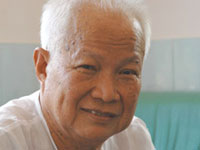Former Khmer Rouge head of state suffers stroke
Khieu Samphan suffered a stroke Tuesday. He was Khmer Rouge head of state whose arrest by a U.N.-backed genocide tribunal has been widely expected.

Khieu Samphan's daughter in Phnom Penh, Khieu Rattana, said she received news about her father's stroke from her sister in Pailin, the former Khmer Rouge guerrilla stronghold in northwestern Cambodia where her parents live.
A day earlier, two of his colleagues in the brutal 1970s Khmer Rouge regime were arrested by the tribunal.
Ieng Sary, the group's foreign minister, and his wife Ieng Thirith, the social affairs minister, were both charged with crimes against humanity. Ieng Sary was also charged with war crimes.
Khieu Rattana said her sister informed her that their father had suffered a stroke, with numbness on one side of his body. She added that family members and doctors were gathering at the house to tend to their father, who is believed to be 76 years old.
A neighbor, who asked not to be named to maintain good relations with the family, said Khieu Samphan could only speak with difficulty, making his words hard to understand.
The 1975-79 Khmer Rouge regime was blamed for the deaths of some 1.7 million people from starvation, disease, overwork and execution. None of the group's leaders has yet faced trial.
The U.N.-assisted tribunal was created last year after seven years of contentious negotiations between the United Nations and Cambodia.
The arrests of the Khmer Rouge suspects have come almost three decades after the group fell from power, with many fearing the aging suspects might die before they ever see a courtroom. Trials are expected to begin next year.
Four have been arrested so far, including Ieng Sary and his wife.
According to prosecutors' documents made available to The Associated Press, the fifth suspect they are seeking to charge is Khieu Samphan.
Daughter Khieu Rattana said she spoke by phone with her father on Monday and he had said he expected to be arrested in the next few days. She said she did not think this caused his stroke.
"He has been aware all along that he will be arrested. He is not concerned about it and said he is ready to go to the tribunal," she said.
Ieng Sary and his wife said they do not have money to pay for their legal fees and are seeking financial aid, the tribunal's defense support section said in a statement Tuesday. It also said they were in the process of assembling their defense team.
Rupert Skilbeck, the head of the section, said the U.N. will pay legal fees for all defendants until the end of this year. It is assessing the defendants' financial situation to decide whether to continue helping them.
The appeal for financial assistance was disparaged by fellow Cambodians, who said the couple lived a relatively lavish life in a villa in the capital, Phnom Penh.
Ieng Sary and Ieng Thirith defected to the government in 1996 and have been living in relative comfort since then. A tribunal document released this week said he is 82 years old and she is 75.
Ieng Sary "promoted, instigated, facilitated, encouraged and/or condoned the perpetration of the crimes" when the Khmer Rouge held power, according to a July 18 document presented by the tribunal's prosecutors to its investigating judges.
The document said there was evidence of Ieng Sary's participation in crimes which included planning, directing and coordinating Khmer Rouge "policies of forcible transfer, forced labor and unlawful killings."
The alleged crimes of his wife, Ieng Thirith, include her participation in "planning, direction, coordination and ordering of widespread purges ... and unlawful killing or murder of staff members from within the Ministry of Social Affairs," the prosecutors said.
Nuon Chea, the former Khmer Rouge ideologist, and Kaing Guek Eav, also known as Duch, who headed the Khmer Rouge S-21 torture center, were detained earlier this year on charges of war crimes and crimes against humanity.
U.S. Ambassador Joseph Mussomeli said the arrests of Ieng Sary and his wife have helped generate more confidence in the tribunal process, noting previous concerns that an amnesty Ieng Sary received as a reward for defecting to the government might shield him from prosecution by the tribunal.
"There were people who've thought Ieng Sary was untouchable, that they're too frightened to arrest him, and (now) they have," he said.
"I think a lot of the nay-sayers (and) those who were so skeptical and cynical (about the tribunal) need to reassess now that the judicial process is going quite well," he said.
Subscribe to Pravda.Ru Telegram channel, Facebook, RSS!


